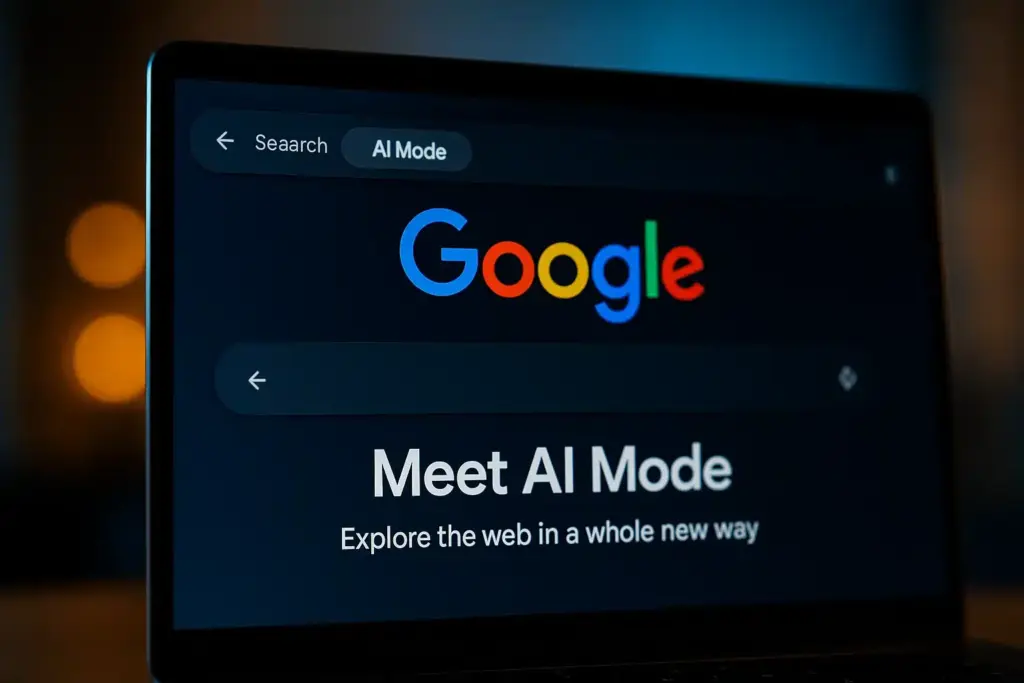
A major shift has arrived on your Google Search page—and it looks a lot more like a chatbot than the search engine you’re used to. Google officially rolled out AI Mode to all English-language users in the U.S. over age 13 on July 1, following a preview at its I/O 2025 developers conference. This new feature, powered by Google’s Gemini generative AI, is now available as a new tab directly in your Search bar.
The goal is to deliver conversational, intelligent responses rather than just links—ushering in the next era of how we find information online. This development follows Google’s ongoing efforts to integrate artificial intelligence into its suite of services, aiming to redefine user interaction with technology.
What Is Google AI Mode?
AI Mode acts like a smart assistant built into Search. It uses a custom Gemini AI model to provide context-rich, multi-layered answers to your questions—complete with links, graphs, and follow-up suggestions. It’s designed to handle complex, multi-part queries and offer more thoughtful, human-like responses.
Google describes this as a “query fan-out technique,” which breaks down one question into multiple sub-questions to deliver more complete results. This isn’t just text; for product searches, AI Mode offers interactive recommendations. For sports and finance queries, it will soon generate real-time graphs and data visualizations, expected to arrive later this summer.
More Personalized Integrations
One of the biggest upgrades coming soon is AI Mode’s integration with your Google apps. Ask for restaurants in a city you’re visiting, and it might factor in your Gmail flight confirmations or Calendar events to personalize the suggestions. You’ll be able to disable this access, but the direction is clear—Google wants to offer context-aware search that feels more like talking to a virtual assistant than typing into a search bar.
This development follows a broader industry trend towards personalization, as tech companies strive to create more tailored user experiences. According to sources, this could potentially revolutionize how users interact with search engines, making them more intuitive and user-friendly.
How AI Mode Works on Mobile and Desktop
AI Mode appears as a new tab at the top of Google Search, similar to Images or News. On mobile, it works just as smoothly—whether you’re using Chrome or Safari. You can also access it directly via a dedicated URL for an all-in-one AI experience.
For deeper questions, a new “Deep Search” feature will scan hundreds of search threads to generate long-form, cited answers within minutes. This represents a significant leap forward in how search engines can process and deliver information, potentially setting a new standard for the industry.
Why It Matters: The Future of Search
This rollout marks a turning point for how we interact with the internet. Instead of searching “best Father’s Day gifts,” you might now ask, “What should I get my dad who loves Roman history and woodcraft?”—and AI Mode will respond with tailored, thoughtful ideas.
Google’s head of Search, Elizabeth Reid, says the move is about elevating search from information retrieval to intelligent assistance.
“This is the future of Google Search,” Reid said. “A search that goes beyond information to intelligence.”
Not Everyone Is Sold
Still, not all experts are convinced that AI Mode will work for everything. Eugene Levin, president of SEO tool Semrush, believes many users will still prefer traditional search for fast answers like movie facts or specific URLs.
“AI Mode is best for complex, multi-layered queries,” Levin said. “But if you just want quick facts, regular search might still be faster.”
He suggests that users will naturally switch between AI and traditional search depending on their needs—just like many ChatGPT users still turn to Google for certain topics. This development follows a pattern of user adaptation to new technologies, where initial skepticism often gives way to broader acceptance over time.
What’s Next For Google Search?
While AI Mode is currently optional, don’t expect it to stay that way. Google says many of its features will eventually be baked directly into core Search. This move represents a strategic shift towards integrating AI more deeply into everyday technology use.
So whether you’re ready or not, the age of chat-powered search is here—and it’s changing everything. As the technology evolves, it will be crucial to watch how users adapt and how Google continues to refine its AI capabilities to meet growing expectations.





